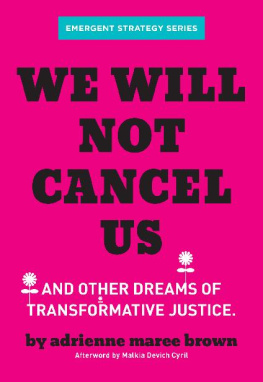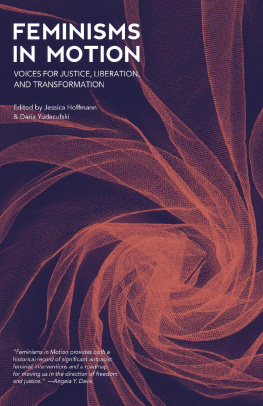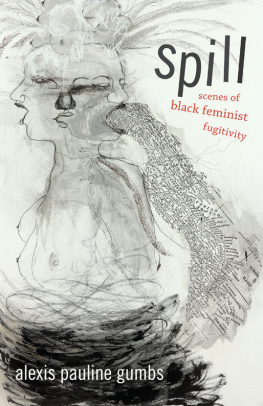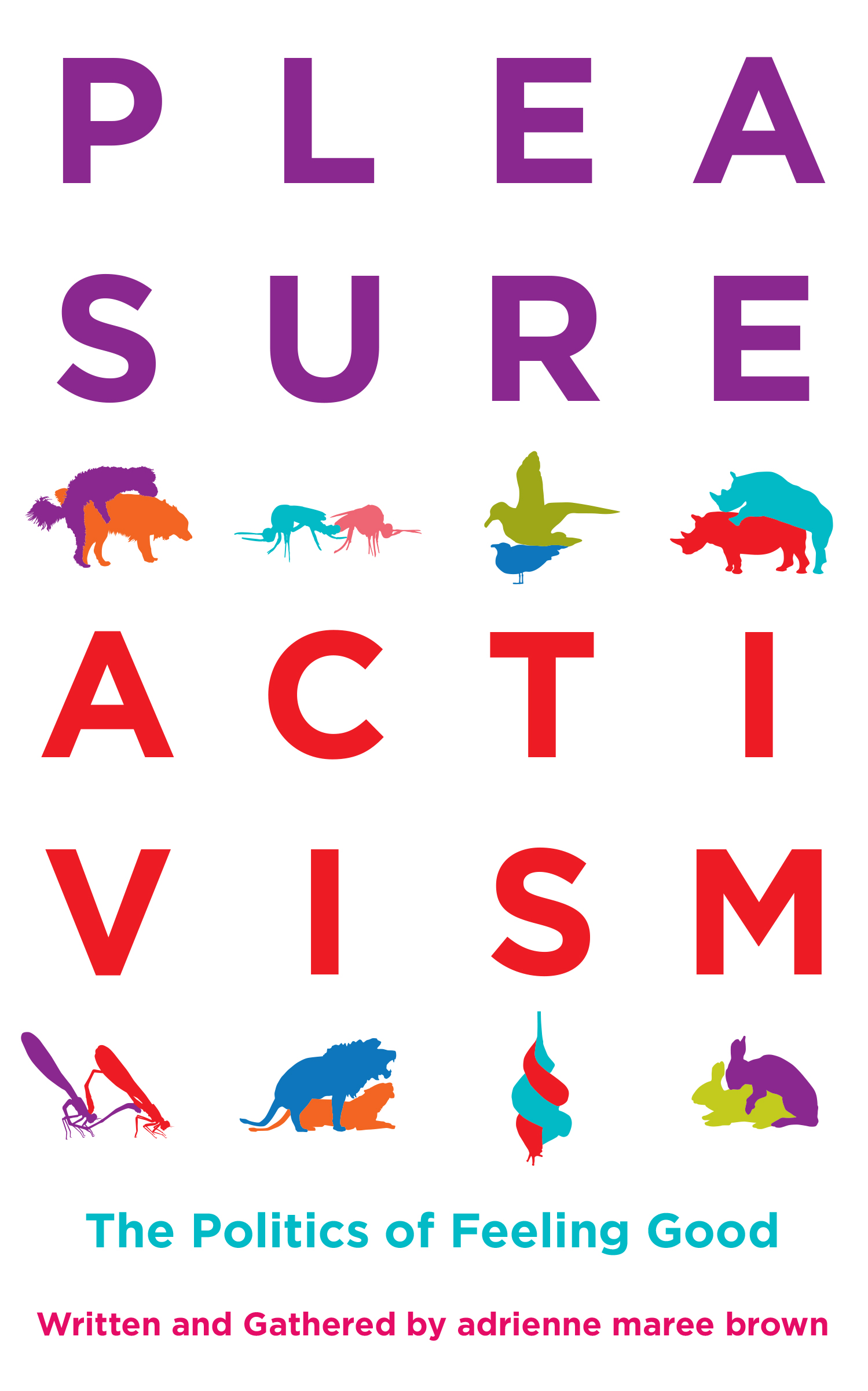I dedicate this book to Alana Devich Cyril (April 17, 1976October 27, 2018), who I loved and learned from during the journey of creation and pleasure research for this book (and include as a teacher in these pages). She said, Drink in beauty. Pleasure is a practice. Practice pleasure like your life depends on it.
I also dedicate this book to Prince for the awakening. He said I only wanted one time to see you laughing.
Introduction
The role of the artist is to make the revolution irresistible.
Toni Cade Bambara
Hello. Welcome to Pleasure Activism: The Politics of Feeli ng Good .
My name is adrienne maree brown. I am a facilitator, emergent strategist, doula, healer, auntie extraordinaire, and pleasure activist. I am your host in this sensual space, your learning companion on this pleasure journey, possibly even an arrow pointing to your erotic awakening. I have gathered here everything I know so far about pleasure activism in the form of essays, interviews, profiles, poems, a nd tools.
My intentions for readers of this book are that you
- recognize that pleasure is a measure o f freedom;
- notice what makes you feel good and what you are curi ous about;
- learn ways you can increase the amount of feeling-good time in your life, to have abundant pleasure;
- decrease any internal or projected shame or scarcity thinking around the pursuit of pleasure, quieting any voices of trauma that keep you from your full sacred sen sual life;
- create more room for joy, wholeness, and aliveness (and less room for oppression, repression, self-denial and unnecessary suffering) in your life;
- identify strategies beyond denial or repression for navigating pleasure in relationship to o thers; and
- begin to understand the liberation possible when we collectively orient around pleasure and longing.
- Bonus: realize you are a pleasure activist!
Trust is a crucial part of the intimacy that yields pleasure for ourselves and others. Most likely you dont know me, so whatever trust can exist between us will come from how well I can share and how much you can open yourself to what I share. In that spirit, it feels important that you know a bit about my identity, contradictions, practices, and desires as they relate to pleasure.
I have a Black father and a white mother with a big love story, and I grew up in all of the possibility of that. My family has not escaped white supremacy, racism, internalized racism, or colorism, but we have experienced those patterns and sicknesses from a position of love that can see through them to the humans beneath the socializatio n. Mostly.
I identify as a Black mixed person in the particular racial construct of this country at this time. I understand that race is a social construct, not a biological oneand in this life I experience a lot of pleasure in being Black. I love Black girl magic, Black joy, Black love, and work toward Black liberation. I feel unapologetic glee at the ways in which we subvert white supremacy, dominate culture, and coolness, often inviting people to the pleasures we have constructed from dreams and thin air.
And I understand this to be temporarythat there were, among my ancestors, feelings of love to be of tribes whose names I will never know or from nations no longer on any maps. In the future, there may be a time when the term Black feels to my nibblings nibblings the way the terms Negro or Quadroon sound to me now; perhaps these future nibblings will invent new terminology indicating some way of understanding themselves that I cannot comprehend. There may be a time beyond these borders, beyond these racial constructs, beyond this planet even. I feel humble in the face of all that time. And, in this time, its a gift to be Black.
Similarly, I am learning that much of how we experience and practice gender is a social constructand I love the particular pleasures of being a woman. I love being of women who transform the brutal conditions we survive, who are upending rape culture, knowing we are inferior to no one, weaving our suffering into a fierce togetherness, into homes, chosen families, radical sisterhood, and t omorrows.
And Im a woman with some boy in me and havent found the language for that.
I know it is a privilege to feel aligned with the gender assignment I was given at birth. I love the bodies I was born from and with. And I love the wildly diverse spectrum of bodies I have gotten to hold, kiss, doula, and love in my lifetime.
I imagine there have been periods in my ancestry when gender was held very differently, maybe didnt matter so much, or was less binary. And I imagine there will be a future with a multitude of widely known and understood genders. In this moment, I get to be part of the expansion of possible genders that can live and love safely on thi s planet.
This book will center the experiences of Black women pursuing and related to pleasure, because these are the particular experiences with which I am both most familiar and most in community. But I am also always human and take seriously the truth that I am connected to all humans. I do not subscribe to any politics of reduction. I may see the humor in stereotypes, but I do not live my life or desires through the lens or limitation of anyone elses construction of power, identity, or supremacy. This book includes a few voices that are not Black or woman-identified but that I trust in the human experience of finding pleasure beyond o ppression.
I have been a student of facilitation since my late teens, learning how to make it easier for people to be with each other. Along this journey I have been asked to facilitate people at a lot of different levels, each request teaching me more about what facilitation can docoach, healer, doula, relationship supporter, grief supporter and death doula, breakup guide, and confidante for sexual adventures, as well as an organizational, network, and coalition/alliance facilitator. I have often said yes, sometimes with trepidation, often with enthusiasm, because I am fascinated by how we interact with ea ch other.
This book comes about partially because I realized that I have supported thousands of people in taking steps they crafted, articulated, and needed to takesteps closer to pleasure and liberation. I have seen, over and over, the connection between tuning into what brings aliveness into our systems and being able to access personal, relational and commun al power.
Conversely, I have seen how denying our full, complex selvesdenying our aliveness and our needs as living, sensual beingsincreases the chance that we will be at odds with ourselves, our loved ones, our coworkers, and our neighbors on thi s planet.
I enter this book with a lot of experience pursuing pleasure and power in human systems and a ton of hope and curiosity about what might be possible if we were all living our full pleasure potential. What would happen if we aligned with a pleasure politic, especially as people who are surviving long-term oppressive co nditions?
In the writing and gathering process, whenever I came to one of my edges or limitations, I reached out and gathered in a comrade who knows more than I doabout sex work, BDSM , burlesque, legalizing marijuana, pleasure during gender transition, recovering pleasure after childhood sexual abuse, pleasure while battling cancer, pleasure over age sixty, and parenting to generate pleasure-oriented children. I think the tapestry of voices here shows how many people are orienting toward and around radical pleasure in this political moment and just how many ways there are to do that.






